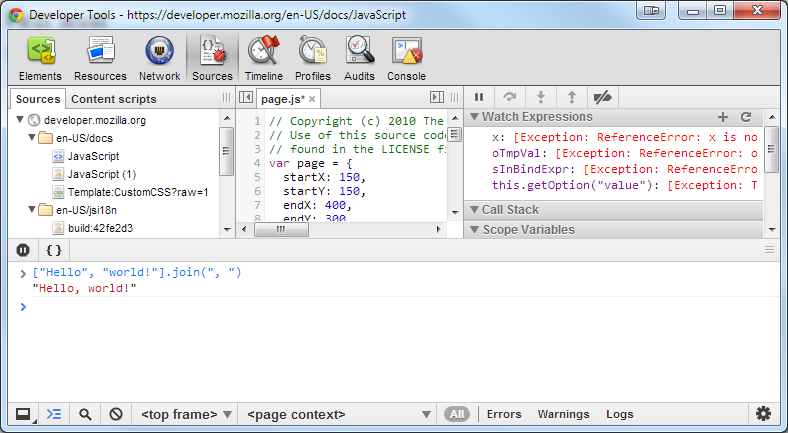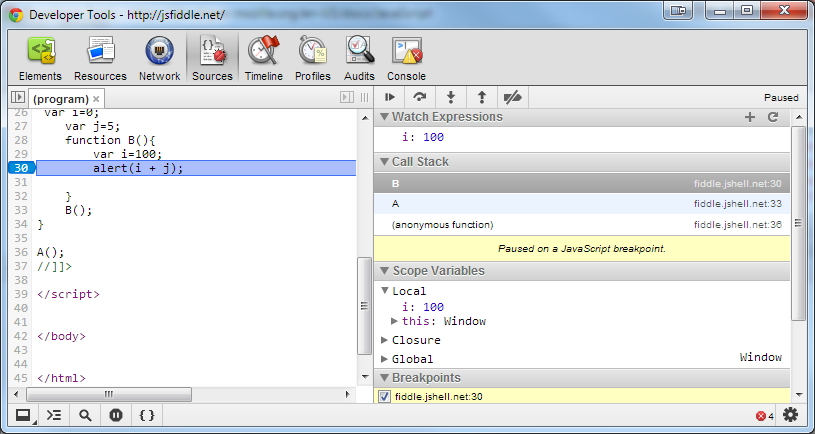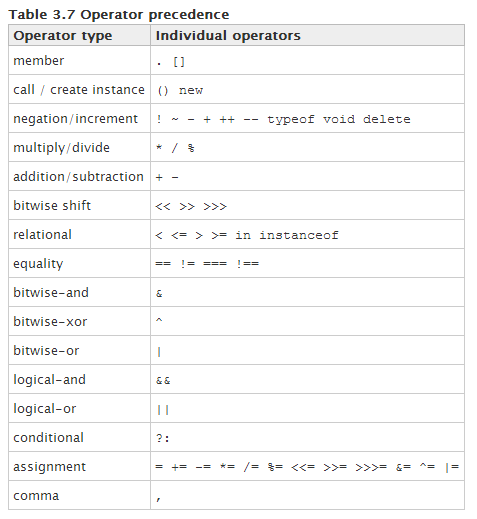Dive into JavaScript
A Brief Introduction of JavaScript
Created by Jianrong Yu
History of JavaScript
Those who do not read history are doomed to repeat it. (by George Santayana)
Birth of JavaScript
- Lightweight interpreted language for nonprofessional programmers (like Microsoft's Visual Basic) in 1995.
- Standardized as ECMAScript in 1996.
Evolution of ECMAScript
- Edition 3: Published in December 1999, most widely implemented version
- Edition 4: Abandoned in 2008
- Edition 5(5.1): Plulished in December 2009, implemented in IE9+ and all other browsers.
- Edition Harmony: Former edition 4
ECMAScript Edition5 - Strict Mode
Strict mode added to ECMAScript Edition 5 to standardize the behaviour of Javascript.
Activate the Strict Mode:
Add "use strict"; to the first statement of any excution context.
run
Playground
Developer tools in browser:
- Chrome Webkit developer tools
- Firefox firebug
Chrome - Code evaluation

Chrome - Debug support

Online Playground
Try the hidden button on the bottom left corner of the page.
run
Types
Types - 5 primitive types
Primitive types:
- Undefined
- Null
- Boolean
- String (Immutable)
- Number (double/32bit integer)
Number literal
123, -123
1.5, 2.34e20, -1.2e-20
0xAFF, 0x1FFFFFFFF
023, 077
String literal
'string', "string", '"double quotes in single quotes"', "'same for single'"
'你好', '𠀰𠀱𠀲𠀳𠀴'
\uHHHH (unicode, BMP only), \b (backspace), \f (formfeed), \n (newline), \r (carriage return), \t (tab), \' , \"
run
Types Operator: typeof

Explicit Type Conversion
Boolean()String()Number()
And other ways:
run
Implicit Type Conversion
Implicit type conversion happended for a lot of operators.run
Types - Map-like object
run
Object Type Operators
indeleteinstanceoffor (in ...)loop (unordered)
run
Object copy by reference
Object is always copied by reference.
run
Global Object
There is always a global object in ECMAScript environment.
windowin web browserglobalin nodejs
run
Identifier
Identifier in ECMAScript
Identifier in Javascript:
- Start with _, $, alphabet character or other unicode letter
- Used in loop label ,variable name and object properties assign/get
run
Reserved Words in ECMAScript
Identifier cannot be any of the following reserved words:
Null and Boolean Literal:
Keyword:
Reserved words for future:
Strict mode:
null true false
break case catch continue debugger default delete do else finally for function if in instanceof new return switch this throw try typeof var void while with
class const enum export extends import super
implements interface let package private protected public static yield
Words in Global Object
Attention: These words are properties of Global Object and avaliable for identifier, but DO NOT USE THESE WORDS FOR IDENTIFIERS!
undefined:
Primitive type wrapper:
Special number:
Other built-in ECMAScript class:
undefined
Boolean Number String
NaN Infinity
Object Function Array Date RegExp
Operators
Basic operators
+ -(subtraction ) * / % ++ -- + -(Unary negation)
& | ^ ~ << >> >>>
+= -= *= /= %= <<= >>= >>>= &= ^= |=
Comparison and other operators
== != > >= < <= === !==
&& || !
+ +=
run
Special operators
condition ? val1 : val2
,
delete in instanceof new this
typeof void
Operator precedence

Statements
Comments
// this is a line comment
/* this is a block comment */
<!-- this is a HTML comment -->
Variable Declaration and Hoisting
var name_1 [ = value_1] [ ,..., name_n [= value_n]]
run
Function Declaration and Hoisting
function functionName([arguments list]) { [statements] }
var foo = function([arguments list]) { [statements] }
run
Conditionals
if (expression) { statements } [ else if (expression) {statements} ]
switch (expression) { case x: statements; break; [default: ...] }
condition ? val1 : val2
Loops
while (expression) statements
do statements while (expression);
for (initialize ; test ; increment) statement labled break:
label: for(...) { break/continue label; }
run
For in Loops
for (key in object) Warning:
- Unordered
- Use on simple data object only!
- Do not use on Array
run
Return
return expression; run
Exception
try{ statements }[ catch(exception){ statements } ] [ finally{ statements } ] throw expression;run
Note
withrun
No block scope
run
Function
Declaration and Expression
function foo( [argument list] ) { statements }( function [bar] ( [argument list] ) { statements } )run
Optional parameters
run
Function is Object
Function is object with:
Internal [[call]] method
Internal scope context object
Internal JS code content
Other members
run
Scope Chain and Closure
run
Invocation
functionFoo.call( object [, arg1 [,arg2 ...]] ) functionFoo.apply( object [,argument list] ) run
new Invocation
Function is used for class constructor and operator
Warning:
new is used for instantiation.Warning:
- Global Object will be polluted if operator
newis missing - Function may return another object
run
How new Works & prototype
Operator
new create new object in several steps:
- Create an empty object
- Assign the internal variable [[prototype]] to Constructor.prototype
- Constructor function is called on the new object
- Return the new object(or the return value of function if an object is returned)
run
prototype chain
Prototype chain is a feature common used for class inheritance in ECMAScriptrun
Extension of Native Prototypes
Native Object can be extended by modify the prototype of their Native Constructors.
Note: Monkey patching on native object is not recommended, the only exception is backport the features of newer JavaScript specification.
Note: Monkey patching on native object is not recommended, the only exception is backport the features of newer JavaScript specification.
run
More on prototype
in vs hasOwnProperty: prototype chain will not be checked for hasOwnPropertinstanceof: check if the class function's prototype in the prototype chainisPrototypeOf(ECMA5): check for the instanceObject.getPrototypeOf(ECMA5): get the prototype of an instancerun
Built-in Object
Global Object
The root object of ECMAScript environment. Value properties
Function properties
window in browser and global in nodejs.
NaN Infinity undefined
eval() parseInt(string, radix) parseFloat(string) isNaN(number) isFinite(number) decodeURI(encodedURI) encodeURI(uri) decodeURIComponent(encodedURIComponent) encodeURIComponent(uriComponent)
escape/unescape Object Objects
Constructor methods: (ECMA5 Only)
Property related
Internal state
Others
defineProperty defineProperties getOwnPropertyDescriptor getOwnPropertyNames
freeze isFrozen preventExtensions isExtensible seal isSealed
getPrototypeOf create keys
Object Objects
Portotype methods
constructortoStringtoLocaleStringvalueOfhasOwnPropertypropertyIsEnumerableisPrototypeOf(ECMA5)Array Objects
[value1, value2, ...]
isArray(ECMA5)
run
Array Objects
Portotype variables and methods
Methods will generate a new Array
Methods will modify the Array itself
Methods to convert to string
New methods in ECMA5 (implemented in es5-polyfill)
Instance variables
concat slice
pop push shift unshift splice reverse sort(unstable, string comparison default)
toString join
indexOf lastIndexof every some forEach map filter reduce reduceRight
Instance variables
length
Array Objects
Note:
Do not use
Methods are working on other Array-like object too.
for ( ... in ...) loop on Array object, elements may be unordered, methods on polyfill may be enumerated.typeof method is not working for type check, use Object.prototype.toString.call() instead (or Array.isArray if ECMA5 is avaliable). run
Primitive type wrappers
There are three primitive type wrappers in ECMAScript make primitive types working like Object.
Note: Do not use
StringNumberBooleanNote: Do not use
new to create primitive wrapper!
run
Type wrapper:String
Constructor methods:
Generate character from unicode
fromCharCode()
run
Type wrapper:String
Portotype methods:
Generate a new String
Return other value
Instance variables:
charAt concat replace slice(start, end) substring(start, end) toLowerCase toUpperCase trim() substr
indexOf lastIndexOf search(regexp) match(regexp) localeCompare charCodeAt([]) split(seperator) Instance variables:
length
Type wrapper:Number
Constructor variable properties:
MAX_VALUE : 1.7976931348623157*10308MIN_VALUE : 5*10-324NaNNEGATIVE_INFINITYPOSITIVE_INFINITYType wrapper:Number
Portotype methods for string format:
toString( [ radix ] )toFixed(fractionDigits)toExponential (fractionDigits)toPrecision (precision)Type wrapper:Boolean
Nothing special.
Function Objects
Portotype methods and variable properties:
toStringapplycallbind (ECMA5, implemented in es5-polyfill)lengthrun
Date Objects
Constructors:
Constructor methods:
new Date (year, month [, date [, hours [, minutes [, seconds [, ms ] ] ] ] ] ) (Note: local time)new Date (value) (value can be Date String or number)Constructor methods:
parse(string) Parse Date String to number(milliseconds) UTC(year, month [, date [, hours [, minutes [, seconds [, ms ] ] ] ] ] ) Return a number(milliseconds) now() Return the current time in number(ms)Date Objects
Portotype methods:
String formatter
Value manipulate
Other
toDateString() toTimeString() toISOString() toJSON()
(get/set)FullYear, Month, Date, Day, Hours, Minutes, Seconds, MilliSeconds (getUTC/setUTC)FullYear, Month, Date, Day, Hours, Minutes, Seconds, MilliSeconds getTime/setTime getYear/setYear
getTimezoneOffset
RegExp Objects
Literal
/[RegExp pattern]/[gmi]new RegExp(pattern, flags) exec() test() global ignoreCase multiline lastIndex source Error Objects
Portotype variable properties:
name message EvalError RangeError ReferenceError SyntaxError TypeError URIError The Math Object
Constants
Trigonometric functions
Arithmetic functions
Other functions
E LN10 LN2 LOG2E LOG10E PI SQRT1_2 SQRT2sin(x) cos(x) tan(x) asin(x) acos(x) atan(x) atan2(y,x)
pow(x,y) sqrt(x) exp(x) log(x) abs(x) floor(x) ceil(x) round(x)
max ([ value1 [ , value2 [ , … ] ] ])
min ([ value1 [ , value2 [ , … ] ] ])
random ()
The JSON Object
JSON (JavaScript Object Notation) is a lightweight data-interchange format (http://www.json.org/).
Functions
parse(text, [receiver])stringify ( value [ , replacer [ , space ] ] )run
Best Practices
Use JSLint/JSHint
JSLint or JSHint to check several potential bug on the code(Used on the embeded code editor too).
To prevent:
- Missing semicolons
- Risky code
run
Do not
- Use
with(){} - Use
eval()(except for deserialization) - Modifying prototypes of builtin objects (especially on Object.prototype and Array.prototype)
- Wrapper objects for primitive types
- Use
for-inloop for complex object or array
Always
- Explicit scope
- K&R Code Style (curly braces on line end)
- Use JSHint/JSLint to check the code before submit
Tricks
- Use
val ? foo : bar - && and || for shorten code
foo&&foo.bar&&foo.bar.method()
var defaultValue = foo || 100;
Common patterns: Immediate Function
- Immediate Function is common used to prevent Global Object pollution.
run
Common patterns: Private variables
- Private variable and methods can be hidden by closure.
run
Common patterns: Options argument
- Data object is common used for named options of function.
run
Reference
THE END
BY Jianrong Yu
With presentation framework reveal.js.
Fork the trainning on GitHub.
╋
ECMAScript Console
Switch To Code Pad
ECMAScript Code pad
Switch To Console
run